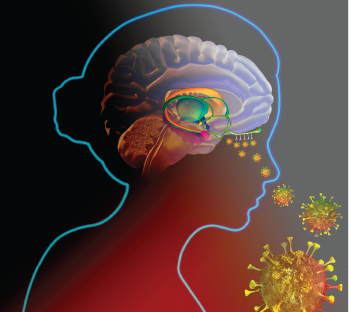
© FERNANDO DA CUNHA / Science Source
Anosmia has been widely acknowledged as a symptom of COVID-19. While olfactory dysfunction (OD) can be the first (and sometimes the only) symptom of COVID-19, some survivors still have not recovered their sense of smell nearly 18 months into the pandemic.
Explore This Issue
August 2021Many people, including physicians, may not be aware that olfactory distortions like parosmia, a distorted sense of smell, and phantosmia, olfactory hallucinations, are also associated with COVID-19. “They may mistakenly think this is something neurological or psychological,” said rhinologist Carol H. Yan, MD, an assistant professor at UC San Diego Health who specializes in rhinology and endoscopic skull base surgery. “But there are many COVID-19 patients who, unfortunately, experience this phenomenon.”
The exact reason for post-COVID-19 OD still isn’t completely understood, according to olfaction expert Jennifer Villwock, MD, an associate professor in the department of otolaryngology–head and neck surgery at the University of Kansas Medical Center in Kansas City. “It can be from viral-induced olfactory nerve damage, local inflammation and damage to the supporting cells and sinonasal epithelium, or both,” Dr. Villwock said. She added that approximately 90% to 96% of patients, depending on the study and timeline of follow-up, will experience at least some recovery of olfaction within 30 days of onset. Recovery rates tend to plateau after this time, with some studies reporting small gains in function out to 12 months.
For patients whose smell loss is longer lasting after COVID-19, doctors are starting to see a similar pattern to smell loss that occurs after other viruses. Eric Holbrook, MD, an associate professor at Harvard Medical School and division chief of rhinology at Massachusetts Eye and Ear in Boston, said this type of anosmia can go on for months; some of his patients are having difficulty even after a year.
“With non-COVID-19 post-viral smell loss, the number of people who recover are estimated to be about 60% to 65%,” Dr. Holbrook said. He added that for patients with COVID-19-related smell loss, about 35% don’t recover in three weeks. “Extrapolating from past non-COVID-19 post-viral smell loss, we could probably predict that of the remaining 35% still having prolonged smell loss, maybe 60% or 70% will recover. We don’t know to what degree they will recover, however, because it’s still early in that assessment, and regeneration and recovery from damage to the olfactory epithelium can take quite a while.”